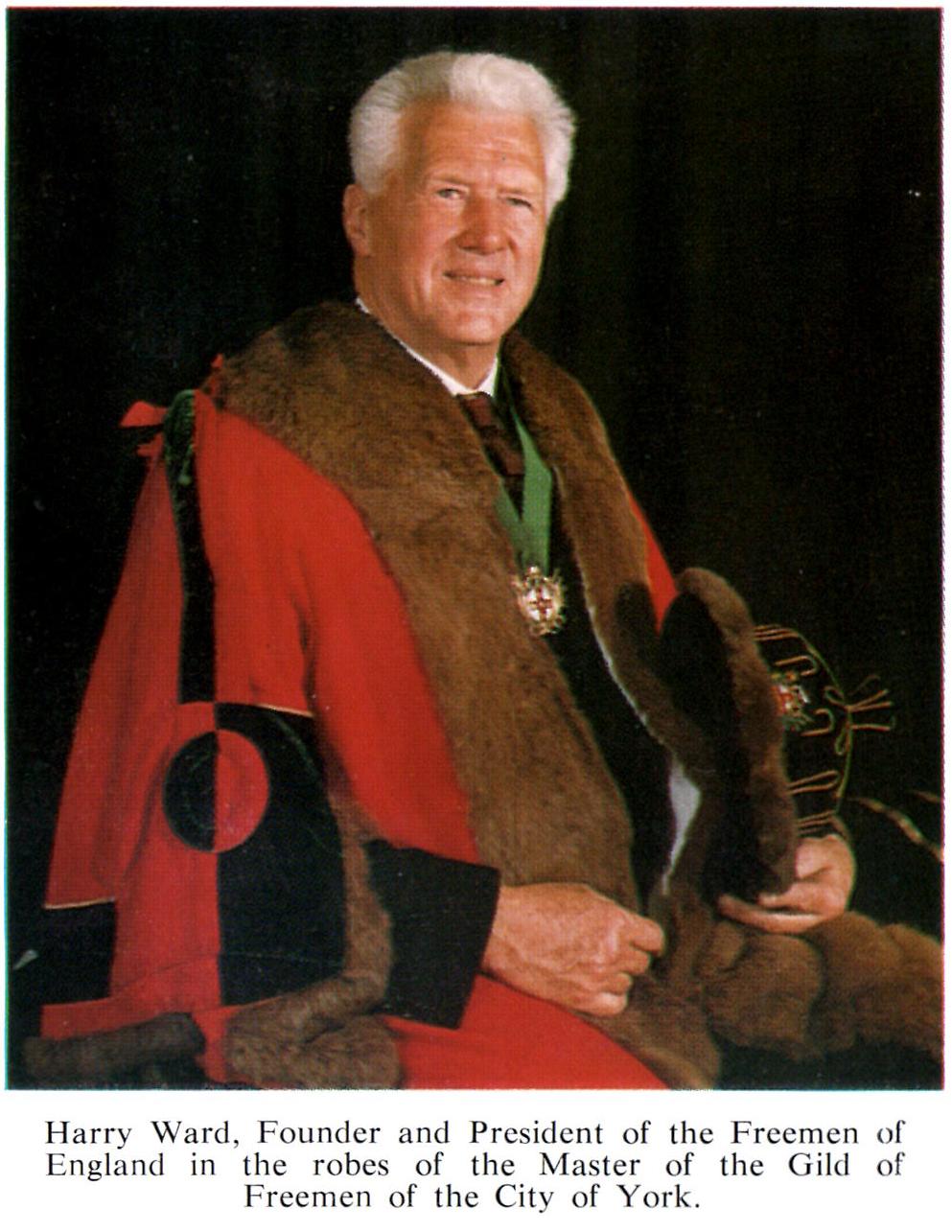
Harry Ward
1897 ~ 1993
Founder President of
the Association of Freemen of England
This article was written by Colonel John Kenyon OBE MC, then Immediate Past President and which appeared in Newsletter 104, February 1993.
Harry Ward – founder of the Association of Freemen of England: leader of the battle to ensure the preservation of the Freedom during the legislative procedures of the Local Government Act of 1972: enthusiast, indefatigable, lovable. Whilst this remarkable man may have withdrawn into the shadows of the Association in his last years, yet these achievements of his – allied to his remarkable character – have remained and will continue to remain a landmark in the history of what may justifiably be described as one of the most ancient and proud traditions of England and Wales – the Freedom.
Harry died on the 11th January 1993, aged 95. I was privileged to represent our Association, flanked by some of our members, not least of whom was Ernest Crapper 0f Oxford, at his funeral in Leatherhead. I was equally privileged to take over from him the Presidency in 1980. To do full justice to him in any obituary would fill pages: but I must be concise and concentrate primarily on his sterling work for the Freedom whilst ensuring that I in no way belittle his many other achievements.
Harry was a man of incredible energy, great enthusiasm, dedication and vision. He also saw, with remarkable intuition, that the common denigration of many of this country’s finest traditions might also embrace that of the Freedom. It was due to this foresight that, in 1966, he formed at York the Association of Freemen of England. His aim thereby was to ensure the creation of a cohesive body of freemen, covering both England and Wales, which could not only be a national lobby and mouthpiece for freemen, but also a means of advising and leading freemen’s guilds on matters concerning common law, the law of custom, and the statutes of the Realm. Only five years needed to pass before Harry’s prophetic concept was put into action in his involvement with the Local Government Act of 1972.
On studying the Bill when it was first published in 1971, he saw at once the death of the Freedom. Acting on his own initiative, but aided by those guilds and members who had already rallied to his side, parliamentary Agents were employed who in turn sought Counsel’s advice: and here begun the splendid and professional service which our Honorary Counsellor, Charles Sparrow QC, has so unstintingly given us for over twenty years (something else for which we are indebted, however indirectly, to Harry!). Visits to, and talks with, relevant Government Departments led to the re-affirmation of the ancient privilege and custom of the Freedom by the inclusion of Clause 248 in the Local Government Act of 1972. There can surely be no doubt that, without Harry’s initiative and foresight in creating our Association, and without his drive and determination, that Clause would never have been included in the Act – and we today would no longer be freemen.
Space permits me only to touch on one or two other aspects of this remarkable man’s efforts on behalf of the Freedom. Until I took over from him in 1980, he ran a “one-man-band”. He travelled the length and breadth of the Kingdom, spreading the gospel, enlisting new membership of existing guilds of freemen, and encouraging the resurrection of those guilds which had become moribund, (but guilds never die). He was, throughout this arduous work at a ripe age, wonderfully supported by his beloved wife Elsie, author of the Freemen’s Anthem. He wrote the only authoritative book on the Freedom – “Freemen in England” – copies of which I have deposited in the libraries of both Houses of Parliament. I believe that there is one thing (of many!) which Harry would love to see, looking down from above; namely, the revision and updating of his book. Indeed, I would suggest to our President and to all members that we can repay to some degree the debt we owe him by undertaking this task.
When I agreed to accept the honour of succeeding Harry, I had to make one stipulation. I realised that I could never match his energy, nor could I spare the time, to run the “monarchic” system involving the carrying of the whole weight on my own shoulders: hence the “federal” system which exists today, involving the creation of regions in whose hands the continuity, health and prosperity of the Freedom rests to a major degree today. At the same time, the appointments of News Letter Editor and Treasurer, all of which had been undertaken by Harry, were made.
I have not touched on any of the many other aspects of Harry’s incredibly full life: service in both World Wars (a Naval Pilot in the First); social worker; scientist; engineer; university lecturer; and family man. I can obtain a fuller obituary if anyone wants one.
So, let me on your behalf express to his son Stephen, and to all his family, our sympathy in their loss and our deep indebtedness to, and affection for, Harry Ward. On three occasions I endeavoured, with the full support of the late Duke of Westminster, to obtain national recognition of Harry’s outstanding work by an honour in Her Majesty’s awards – to no avail. He joins countless others who have similarly failed to be recognised by the nation for their great work, yet who will remain for ever a landmark in our history, and a part of our proud tradition.
